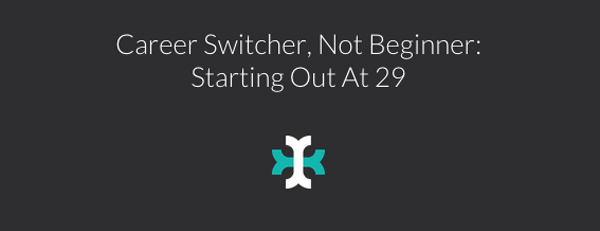I’m 29 with an undergrad degree and masters degree in literature (first person in my family to go to university, the arts seemed a good idea at the time). After my masters I was unemployed for six months and, and utterly desperate by then I took the first job I got offered: as a nanny. I pursued other businesses (blogger, cleaner, tutor, personal trainer, dogwalker, piano teacher) alongside this job because I didn’t really know what I wanted to do after focusing on a PhD for so long.
I took a copywriting course in 2012, and by 2013 I had my first paying client. In January this year I set up a social media handling business with a friend.. Copywriting has made the most money, I always get repeat clients and I enjoy it the most (marketing is FUN!), but it is no where near enough to live on yet. The same goes for the business I set up with a friend.
My plan was, having been given notice in April, was to get a basic entry level marketing job to learn more about the industry, grow my network etc. Which I thought with my experience as a freelancer, I’d stand a much better chance than the newly graduated. However the feedback I’ve had today on my CV is that it is ‘thin’, which is infuriating.
I can’t get an entry level job in marketing/advertising because I don’t have experience. I couldn’t work for free as an intern while at university then, in any field, for family reasons, and now I can’t afford to. I feel like I’m blocked out from traditional working life. My family don’t understand my ambition, or the desire to have more than a ‘job’, which makes for depressing pep talks about job hunting.
My questions are this: Is it the gentlewomanly thing do to just focus on my businesses and have a basic job that guarantees my rent so I can sleep peacefully? Does it matter that I don’t have marketing experience or a marketing degree if I want to be a copywriter full-time? Does it matter that it took me until I was 28 to make money in a ‘professional’ arena?
I have some answers!
I see why you are having a hard time being hired.
You don’t want it to look like you spent most of your twenties slacking off and just now got serious. Employers want young, fast-moving, ambitious, freshly-minted graduates who will work late and have good ideas but also do what they’re told. The “young” part is an illegal preference, but the rest is fair game.
You also don’t want it to look like you’re a frustrated academic who doesn’t really want a job in the private sector, but has — reluctantly — decided to pursue one to pay the bills. Employers want people for whom the job is a first choice.
Options:
Try to spin your resume so that you’re a career switcher, not a beginner.
A 29-year-old applying for an entry-level job just seems weird to a lot of people, as unfair as that might be. But it’s not so weird if it looks as though you have had a successful seven-year career doing something else, and then discovered that your true love is marketing. Can you take all those weird jobs and play up one thing (maybe the blogging?)
Compensate for a lack of a marketing degree with a portfolio of case studies.
Pick a few small businesses owned by people you know, or local nonprofits. Offer to do a free “makeover” of their web copy (for instance), on the condition that you can use the “before and after” on your website, and that, if they’re happy, they’ll give a testimonial for your website and serve as a reference. That way you’re not working for free so much as bartering for really good advertising. (Don’t do this if you have an established business, but this is appropriate at the stage you’re at now.)
Make a super-compelling website or online portfolio with the case studies (or “makeovers”). List what you did (“Over 22 hours, reviewed and revised each page against a six-point checklist”) and what the results were (“Increased online sales by 25% over a two-month period”) in a way that business owners (not copywriters) would care about. Submit this portfolio with your resume, and perhaps give brief synopses of these cases in your cover letter.
In the meantime, of course, use this website/portfolio to get more work for your business.
Use your business to pursue the ultimate goal of a full-time position.
Pitch many companies you’d like to work with. Do NOT contact strangers with a sort of open-ended, “Do you need a copy writer?” No. No, they do not. Rather, suggest something like:
I’m a professional copy writer, and I’ve been receiving your email newsletter for the last few months. While I always enjoy hearing from your company, I’ve recently been working a great deal with research on how people make buying decisions related to [your field]. If you’d be open to it, I’d like to help you increase your response rate and sales from your email newsletters. Basically the way I work with a new client is that you only pay me if you make money, so I hope you’ll let me show you how I can increase your sales.
Or, hold seminars, lunch-and-learns, and webinars on topics like, “Increase your real estate sales with copywriting’s 8 ‘magic words’.” (You can do basically the same seminar over and over, one for real estate, one for retail, etc. — people will be more interested if the topic is more specific to their businesses.) It’s okay to tell people the “secrets” you use in your work. A few people will take your info and run with it, but most people are lazy, and the most desirable clients simply have more money than time. Those clients will say, “Yes, sure I could use her 8 magic words myself to increase my sales, but my situation is messy and I want someone like her to just come do everything for me.”
Do these one-off jobs — maybe “email newsletter makeovers” or something — and make clients really happy. Say you do this for 15 clients. Say 10 of them are really happy. Say 5 of those are places where you might want to work. Try to sell them on continued copywriting services. Have lunches with people to talk about their business and build as many relationships as you can. Say you want to “meet the whole team” so you can get a better idea of their company culture. Make friends and seem like you belong there, ideally so much so that it seems weird when the employees are reminded that you don’t really work there.
You can ingratiate yourself while being open about the fact that you’re really looking for the right company where you can come on board as a full member of the team. Say things like, “I’m working with five companies right now, but I’d like to narrow it down to just one that’s a good fit, and to work on other areas of marketing in addition to email newsletters.” And, when you get the right chance with the right person, ask if they’d be interested in bringing you on full-time. Ideally, you will find a growing company that admires your initiative and entrepreneurialism, and will basically make a job for you. Plenty of smaller companies are kind of limping along without a full-time marketing director at all — either the founder is still doing it all herself, or the tasks have been sort of parceled out to other team members. A company like that that’s growing might just snap you up.
(Keep in mind that you can’t get blood from a stone — if a company is laying people off, cutting expenses, etc., just call an end to the freelance engagement and keep the individuals you worked with in your network. You at least get to feel like a badass for walking away, and it raises your stature when you demonstrate that you don’t take just any work.)
In sum, it’s easier (even though what I’ve just described is difficult!) to make your own opportunity than to compete with dozens (hundreds!) of recent college grads for an entry-level job. Competition for well-defined and well-advertised opportunities is fierce, even if those opportunities kind of suck. There is much less competition for opportunities you make yourself, or where there is only a need and no clarity about how to fill it.
If you provide that clarity — identify a problem (the company wants more sales; clients are willing to recommend them but the company doesn’t know what to do with the recommendations; Google Analytics have been installed but no one knows what to do with the data; everything’s a mess) and offer to fix it — you’re no longer an applicant so much as a walking solution.
Finally, if you’re putting this much effort into building relationships with companies, keep in mind that what they need may not be exactly a copywriter of a marketing manager — it may be something a bit different. Maybe an education company needs someone to maintain their Twitter account, but more importantly needs someone to edit the scripts for their educational videos. Who knows?
In ten years, a lot of people’s jobs won’t exist anymore anyway, or will be unrecognizable.
Instead of focusing on a particular role or job description, focus on providing solutions to people’s real, urgent, painful problems. That’s all people want — they want their problems solved.
Good luck!
Jen









